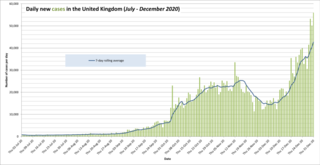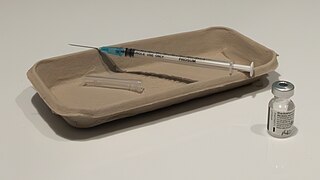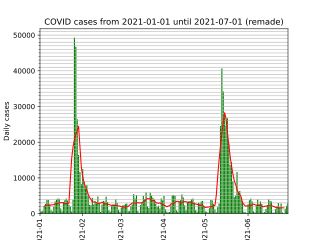
The following is a timeline of the COVID-19 pandemic in the United Kingdom from July 2020 to December 2020.
Vaccination requirements for international travel are the aspect of vaccination policy that concerns the movement of people across borders. Countries around the world require travellers departing to other countries, or arriving from other countries, to be vaccinated against certain infectious diseases in order to prevent epidemics. At border checks, these travellers are required to show proof of vaccination against specific diseases; the most widely used vaccination record is the International Certificate of Vaccination or Prophylaxis. Some countries require information about a passenger's vaccination status in a passenger locator form.

The COVID-19 vaccination programme in the United Kingdom is an ongoing mass immunisation campaign for coronavirus disease 2019 (COVID-19) during the COVID-19 pandemic in the United Kingdom.

The following is a timeline of the COVID-19 pandemic in the United Kingdom from January 2021 to June 2021.
The following is a timeline of the COVID-19 pandemic in the Republic of Ireland in 2021.
The following is a timeline of the COVID-19 pandemic in England during 2021. There are significant differences in the legislation and the reporting between the countries of the UK: England, Scotland, Northern Ireland, and Wales.
The following is a timeline of the COVID-19 pandemic in Scotland during 2021. There are significant differences in the legislation and the reporting between the countries of the UK: England, Scotland, Northern Ireland, and Wales.
The following is a timeline of the COVID-19 pandemic in Wales during 2021. There are significant differences in the legislation and the reporting between the countries of the UK: England, Scotland, Northern Ireland, and Wales.
The following is a timeline of the COVID-19 pandemic in Northern Ireland during 2021. There are significant differences in the legislation and the reporting between the countries of the UK: England, Scotland, Northern Ireland, and Wales.

A COVID-19 vaccine card is a record often given to those who have received a COVID-19 vaccine showing information such as the date(s) one has received the shot(s) and the brand of vaccine one has received, sometimes including the lot number. The card also contains information identifying the recipient and the location where the shot was given. Depending on the country, it could serve as an official document verifying one has received vaccination, which could be required by some institutions, such as a school or workplace, when boarding a cruise ship, or when crossing an international border, as proof that one has been vaccinated.

The following is a timeline of the COVID-19 pandemic in the United Kingdom from July 2021 to December 2021.

A vaccine passport or proof of vaccination is an immunity passport employed as a credential in countries and jurisdictions as part of efforts to control the COVID-19 pandemic via vaccination. A vaccine passport is typically issued by a government or health authority, and usually consists of a digital or printed record. Some credentials may include a scannable QR code, which can also be provisioned via mobile app. It may or may not use a COVID-19 vaccine card as a basis of authentication.

The United Kingdom's response to the COVID-19 pandemic consists of various measures by the healthcare community, the British and devolved governments, the military and the research sector.

This article outlines the history of the COVID-19 pandemic in the United Kingdom. Though later reporting indicated that there may have been some cases dating from late 2019, COVID-19 was confirmed to be spreading in the UK by the end of January 2020. The country was initially relatively slow implementing restrictions but a legally enforced stay-at-home order had been introduced by late March. Restrictions were steadily eased across the UK in late spring and early summer that year.
The COVID-19 Protection Framework was a system used by the New Zealand Government during the COVID-19 pandemic in New Zealand. The three-tier traffic light system used vaccination and community transmission rates to determine the level of restrictions needed. It came into effect at 11:59 pm on 2 December 2021, replacing the four-tier alert level system, which used lockdowns. On 12 September 2022, Prime Minister Jacinda Ardern announced that the traffic light system would be dropped at 11:59 pm that night.
My Vaccine Pass was a vaccine certificate issued by the New Zealand Government that served as an official record of one's COVID-19 vaccination status during the COVID-19 pandemic. The vaccine pass was required to enter hospitality venues, community, sport and faith-based gatherings, as a result of the COVID-19 Protection Framework having come into effect on 3 December 2021. The passes expired on 1 June 2022.

The Health Protection (England) Regulations 2021 is a statutory instrument (SI) made on 13 December 2021 in response to the COVID-19 pandemic. The regulations, which covered England only, were introduced following increasing concerns about the Omicron variant. They mostly came into effect on 15 December 2021 and expired on 26 January 2022.

The following is a timeline of the COVID-19 pandemic in the United Kingdom from January to June 2022.
The following is a timeline of the COVID-19 pandemic in England during 2022. There are significant differences in the legislation and the reporting between the countries of the UK: England, Scotland, Northern Ireland, and Wales.
The following is a timeline of the COVID-19 pandemic in Scotland during 2022. There are significant differences in the legislation and the reporting between the countries of the UK: England, Scotland, Northern Ireland, and Wales.









